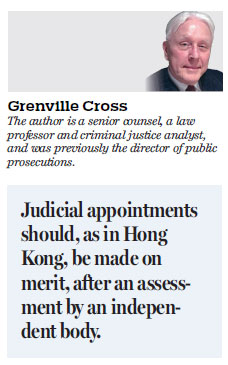HK's independent judiciary offers valuable lesson to US
Updated: 2018-11-09 06:30
(HK Edition)
|
|||||||
Grenville Cross says American politicians who criticize our city's legal system should remember that their own one has become politicized and compromised
Judges should always be impartial, and they are entitled to a fair appointment process. Their role is to apply the law, and not to indulge in judicial activism. Any judicial system is compromised if it becomes politicized - as in the United States.
In Hong Kong, the Basic Law provides that judges are appointed by the chief executive, on the recommendation of an independent commission. For Court of Final Appeal judges and the chief judge of the High Court, their appointments must also be endorsed by the Legislative Council. Since 1997, however, this has been a formality, and the nominees, given their stature, have simply been nodded through, which is in stark contrast to what happens in the US, where the appointment process is unedifying.

The senior judges are recommended for appointment by the president himself, not by an independent body. He invariably selects an ideological soul mate, meaning the process is inherently controversial. The president's Supreme Court candidate is considered by the Senate, where political opponents often seek to block the nominee. In 2016, for example, when outgoing Democratic President Barack Obama nominated Merrick Garland to the Supreme Court, the Republican senators refused to even examine the nomination, which finally lapsed after 293 days, twice as long as any other nomination.
The Supreme Court is immensely powerful, and has been used by the Democrats to effect social change, thereby bypassing Congress, where they often lack a majority. In Hong Kong, fortunately, judges have always recognized the limits of their jurisdiction, leaving lawmaking to the legislators.
Although the Republicans believe the US Constitution must be interpreted as it would have been by the Founding Fathers in 1787, the Democrats see it as a living document, evolving as society changes. Whereas the Republicans consider that policy changes are for Congress to make, the Democrats see the Supreme Court as a means of achieving their social agenda. This, of course, deprives the people of their ability to determine their own laws, as Supreme Court decisions are virtually impregnable, unless overturned later by the judges themselves.
Thus, for example, the Supreme Court's liberal judges have held that the Constitution provides a right to abortion (Roe v Wade), and also gay marriage (Obergefell v Hodges), although these were never contemplated by the Founding Fathers. Although such issues are clearly for the elected Congress to determine, the Democrats have repeatedly sought to block nominees resistant to judicial activism, however well-qualified, as well as social conservatives.
In September, for example, after Judge Brett Kavanaugh was nominated by President Donald Trump to fill a vacancy in the Supreme Court, the Democrats sought to thwart him. Kavanaugh had served with great distinction for 12 years on the US' second-highest court, the US Court of Appeals for the District of Columbia Circuit, and his nomination seemed assured. However, late in the day, a Democratic senator, Dianne Feinstein, decided to unveil allegations of sexual assault against him, dating from his schooldays.
In consequence, Christine Blasey Ford, a registered Democrat, testified against him in the Senate, and Kavanaugh had to respond, saying the process was a "national disgrace". He deplored the Democrats' use of "search and destroy" tactics against him, pointing out that he faced retaliation "on behalf of the Clintons", given his previous involvement in the impeachment investigation of former Democratic President Bill Clinton. Although the Senate narrowly endorsed Kavanaugh, Republican Senator Lindsay Graham apologized for his ordeal, saying "you came to the wrong place for a fair process". Kavanaugh, however, was not the first jurist to have been treated in this way.
In 1991, after President George H.W. Bush nominated Clarence Thomas, a conservative African American jurist, for the Supreme Court, a similar attempt was made by Democratic senators to destroy him. Again, allegations of sexual assault were leveled, but Thomas narrowly scraped through, with Republican backing. Thomas described the process as a "circus", designed as "a high-tech lynching for uppity blacks". His "crime", of course, in Democratic eyes, was that he believed in traditional values, and felt it was up to Congress to make the country's laws.
However, in 1987, the Democrats enjoyed greater success. After Republican President Ronald Reagan nominated appeal court judge Robert Bork to the Supreme Court, he was subjected to unprecedented character assassination, with Democratic Senator Ted Kennedy proclaiming that "no justice would be better than injustice". Despite his brilliance, Bork's nomination was defeated, which was a great loss to the nation, but his name lives on. The Oxford English Dictionary describes the verb "bork" as political slang, meaning "to defame or vilify systematically".
The US' judicial appointment system is in a mess, and provides an object lesson in how not to go about things. Distinguished jurists find themselves vilified, even destroyed, for political reasons, and many potential nominees are now said to be reluctant to run the gauntlet. Nominees apart, their families also suffer, with Kavanaugh's wife and daughters having undergone a horrendous ordeal and requiring police protection, which is intolerable. The system is broken, and now requires an injection of objectivity, decency and respect, together with a recognition that judges, once appointed, are not, and should not behave like, politicians.
Judicial appointments should, as in Hong Kong, be made on merit, after an assessment by an independent body. The Supreme Court, like the Hong Kong Court of Final Appeal, must avoid judicial activism, and concentrate upon interpreting existing law, not making new laws. Once judges trespass into the realm of legislators, they risk forfeiting public confidence, as has already happened stateside.
Although some American politicians are always quick to decry Hong Kong's legal system, they must remember that "those who live in glass houses should not throw stones".
(HK Edition 11/09/2018 page13)